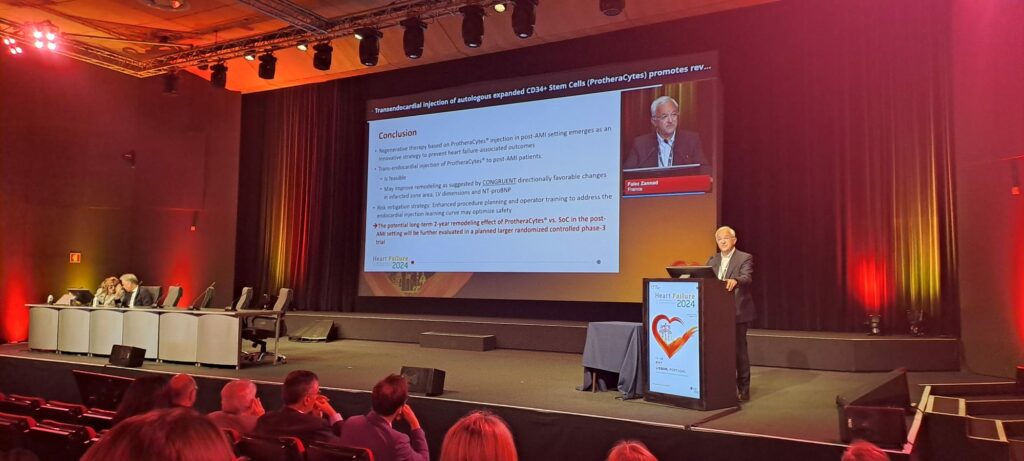14 May CellProthera announces positive Phase I/IIb data for ProtheraCytes® cell therapy in acute myocardial infarction
- Positive changes in prognostic biomarkers including infarct size, left ventricular dimensions and NT-proBNP level support the anti-remodeling effect of ProtheraCytes cell therapy in post-myocardial infarction patients at risk of heart failure
- Data presented today at Heart Failure 2024 conference in Lisbon
Mulhouse, France, May 14, 2024 – CellProthera, a regenerative cell therapy company developing breakthrough treatments for ischemic diseases, announced positive results from a Phase I/IIb study of its lead ProtheraCytes® in patients following a severe heart attack, positioning the stem cell therapy as a promising option to repair and regenerate heart tissue. The data was presented today by Faiez Zannad, MD, PhD, chairman of the study’s steering committee and emeritus professor of therapeutics at the Université of Lorraine.
Even with optimal guideline-directed medical therapy, mortality from ischemic heart failure and other causes within the first 12 months after AMI is between 5-10%. ProtheraCytes can promote revascularization, regulate inflammation, apoptosis and cardiomyocyte regeneration, and are expected to induce the repair process of damaged myocardial tissue.
“We are excited by the promising results of the study, which confirm the mechanism of action of ProtheraCytes and the potential of our therapy to provide an effective one-off solution to prevent heart failure progression in AMI patients,” said Matthieu de Kalbermatten, CEO, CellProthera. “We thank Professor Zannad, the Steering Committee and all the investigators for their great support during the study.”
“The EXCELLENT study further confirms the potential for cardiac regenerative therapy,” said Professor Zannad. “This data suggests patients at high risk following a heart attack may benefit from treatment with ProtheraCytes, to help regenerate post-ischemic myocardial damage and prevent progression to further cardiovascular illnesses. It should be further evaluated in a larger Phase 3 trial.”
EXCELLENT data The EXCELLENT trial included 49 patients at 13 sites in the UK and France, randomized to receive either standard of care alone or in combination with ProtheraCytes. All patients had high troponin levels and persistent left ventricular (LV) dysfunction one week following AMI, characterized by an LV ejection fraction below 50% and non-contracting akinetic heart segments, which were measured using cardiac magnetic resonance imaging (cMRI).
No significant difference in baseline values was observed between the patients in the two treatment arms and more than 90% of patients presented with microvascular obstructions (MVO), a long term predictor of poor outcomes.
The transendocardial injection procedure was considered feasible and safe; periprocedural events were treated with appropriate care. In addition, the favorable changes in blinded central reading secondary endpoints for the ProtheraCytes group included:
- a significant improvement of the viability of segments from baseline to 6 months
- a consistent positive trend of improvement of LV volumes at 6 months
- a faster decrease in NT-proBNP levels
Professor Zannad presented the new data today at Heart Failure 2024 in Lisbon, organized by the Heart Failure Association of the European Society of Cardiology (ESC).


